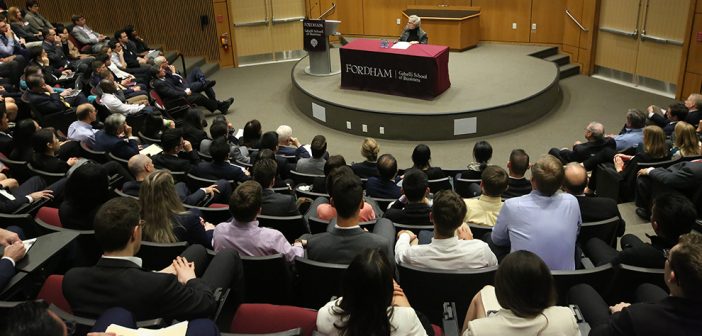Unemployment rates have declined in the United States over the last few years. Since the financial crisis ended more than five years ago, most sectors of the U.S. economy have experienced growth.
Still, many Americans continue to have different points of view about economic growth in the country, according to Abby Joseph Cohen, advisory director and senior investment strategist at Goldman Sachs.“That disconnect in perception is tied to the divergence in the data,” said the veteran Wall Street stock bull, who began working at the firm in 1990 before being named partner in 1998.
“Some people, in fact, have a better set of outcomes than others.”
At a talk hosted by the Fordham Wall Street Council and the Gabelli School of Business on Oct. 17 at the Lincoln Center campus, Cohen said employment performance of the U.S. economy by geography is an important marker. She compared employment data from small towns, which tend to have vanishing industries, with big cities like New York and San Francisco, which have experienced higher job growth.
“Even people who are not educated and are living in a community that is doing well, will do well,” she said.
Cohen, who described the U.S. economy as being on “autopilot” since the recession, said the single fastest growing sector of the U.S. economy is exports.
“That’s probably not what you would have gathered based on political discourse in this country,” she said, explaining that government spending at the federal level is in fact, the only area of the U.S. economy that hasn’t grown.
Unpacking the keys to economic success
A look at economies around the world suggests that inflation is not an issue of concern, she said. Because of these analyses, Cohen didn’t find it surprising that the S&P 500 hit a record high— despite fears about North Korea and the impact of Hurricanes Harvey and Irma.
She also said that economic volatility is no longer at record highs, but at record lows. “For those people who are concerned that the Federal Reserve or other central banks are going to . . . slam their feet on the brakes, that doesn’t seem really likely,” she said.
Cohen emphasized that productivity still determines the long-term success of any economy. While the United States is still the number one spender when it comes to research and development (R&D), U.S. productivity gains are about two-thirds of the level that they were during the post-World War II economic expansion, she said.
“We used to be so far above everybody else that we weren’t even on the scale,” she said.
Now more than ever, countries like Japan, Switzerland, and Germany are investing in an economic model that doesn’t just focus on low-cost production, but on producing things of high quality.
Cohen argued that the common belief that companies would invest more in the future if tax rates were lower, isn’t a viable argument.
“They’ve got plenty of cash, they’re just not using it to the same degree as they did previously,” she said.
She estimates that the economy and profits will continue to climb. Most markets are priced where they should be.
However, she said she is “very conscientious that there are things happening that are outside of the toolkit of quantitatively oriented, data-oriented people like me.”
“That has to do with some of the policy changes that are under discussion and some of the geopolitical instability,” she said.


